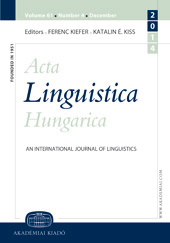The effect of morphological complexity on short-term memory capacity
The effect of morphological complexity on short-term memory capacity
Author(s): Dezső Németh, Rozália Ivády, Alessandro Guida, Márton Miháltz, Donald Peckham, Attila Krajcsi, Csaba PléhSubject(s): Morphology, Psycholinguistics
Published by: Akadémiai Kiadó
Keywords: morphological complexity; short-term memory; chunks; phonological loop;
Summary/Abstract: The main purpose of this study was to explore the relationship between verbal short-term memory and the morphological complexity of words. Hungarian, as an agglutinative language, is of special interest for psycholinguistic inquiries in morphology. The authors presented two word-list recall experiments. The recall of the word list was measured by the classical span design. The item lists consisted of two-syllable stems (base words) and two-syllable morphologically complex words (stem+suffix). Within each list the words were of the same length, the same phonological structure (CVCVC), the same frequency and the same concreteness. The same experimental design was used with three-syllable words as well. Results indicated that morphological complexity had a significant negative effect on shortterm memory span, and that memory was better for derived words (e.g., boy+hood) than inflected words (e.g., boy+s), and regular than irregular words.
Journal: Acta Linguistica Hungarica (Since 2017 Acta Linguistica Academica)
- Issue Year: 58/2011
- Issue No: 1
- Page Range: 85-107
- Page Count: 23
- Language: English

